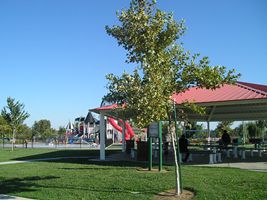The Smithsonian's Anacostia Community Museum presents its groundbreaking exhibition "Reclaiming the Edge: Urban Waterways and Civic Engagement" on view through Sept. 15, 2013, which examines the consequences of the abuse of waterways worldwide and the efforts by communities to restore them.
The world’s only artificial watershed inside the Biosphere 2 at the University of Arizona receives its first rain, giving researchers the first opportunity to study how water, soil, plants, and microbes interact in a realistic setting; this rare chance could help improve future global climate models.
On Dec.11, a new group that hopes to protect and improve water quality and flows of North and South Llano Rivers will be holding a meeting. Local residents are encouraged to attend.

Since the establishment of a state program that donates money to cities and counties for parks when affordable housing communities are built, California has received more than $20 million in funds.
Researchers at Royal Holloway have identified a tobacco tree that could produce biofuels, and have been awarded a grant for further research from the European Union.
Researchers have found that increasing drought conditions have made plants operate at their top safety threshold, making forest ecosystems vulnerable to escalating environmental stress.
According to a plant biologist, buying a real Christmas tree is better on the environment than using an artificial one for a few years and then throwing it away.
In a study performed by the U.S.G.S., bats recovering from white-nose syndrome (WNS) show evidence of IRIS, a condition that is experienced by HIV-AIDS patients. If IRIS is proven to be present in bats surviving WNS, this would be the first natural occurrence of IRIS ever observed.
The U.S. Department of Agriculture (USDA) has developed a new insect growth regulator that helps combat house flies that spread harmful bacteria to food.
Avian pox has been recorded in British bird species such as house sparrows and wood pigeons for a number of years. However, the emergence of a new strain of this viral disease is causing concern amongst vets and ornithologists.
Researchers from the University of Michigan found that ethanol-based liquids mix actively with water, making a biofuel spill potentially more harmful to aquatic life than oil spills.
Researchers have discovered that climate change is creating additional stress on western rangelands, and as a result land owners should consider a reduction or elimination of livestock and other large animals from public lands.
Scientists from the American Meteorological Society (AMS) and the University of California, Berkley have demonstrated that plants and soils could release large amounts of carbon dioxide as global climate warms.
Israel’s first Green Roofs Ecology research center has been dedicated at the University of Haifa. The center will focus on research and development of non-irrigated green roofs that are suitable for Middle Eastern climates.
According to a new study, warmer temperatures cause greater reduction in the sizes of adult aquatic animals than in land-dwelling species.
The 73-foot Spruce Christmas tree that will be decorated outside the U.S. Capitol building this holiday season has begun its 24-day journey from Colorado to Washington, D.C. The Mack truck transporting the tree has near zero emissions due to its clean diesel engine.
Brazil's Salto Morato Nature Preserve is a haven for scientists studying the dwindling Atlantic rainforest, an area less renowned than the Amazon forest but just as biologically diverse and equally threatened by human encroachment.
USDA scientists have identified components of Jatropha curcas seed oil that are responsible for mosquito repellency.
The U.S. Geological Survey crews are sampling water nutrients, sediment, and pesticides in order to document water quality in areas affected by the hurricane.
Researchers have discovered that global warming is the reason plants and animals had a hard time recovering from the largest mass extinction in Earth’s history 250 million years ago.